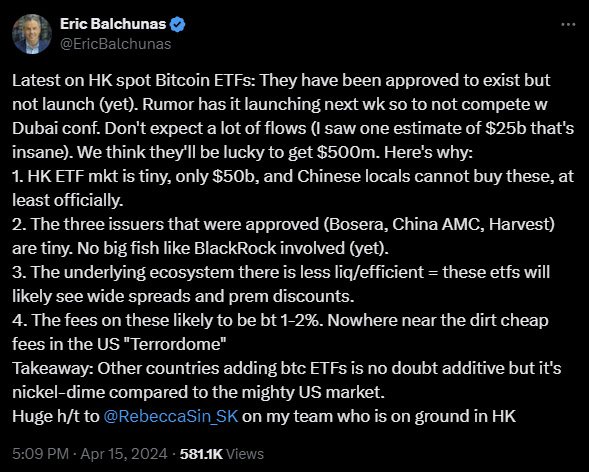In a significant move signaling the increasing institutional investment in Bitcoin, Hong Kong regulators have given the green light for the launch of spot Bitcoin Exchange-Traded Funds (ETFs). This development has sparked excitement in the market, but analysts are tempering expectations, suggesting that the impact may not be as substantial as some anticipate.
Hong Kong ETFs: Exploring the Approval
The Hong Kong Securities and Futures Commission (SFC) recently granted conditional approval to three offshore Chinese asset managers—Harvest Fund Management, Bosera Asset Management, and China Asset Management—to issue spot Bitcoin ETFs. This decision marks a milestone in the adoption of the digital asset within the traditional financial system.
Expert Analysis
Despite the initial enthusiasm, experts caution against overly optimistic forecasts. Bloomberg’s senior ETF analyst, Eric Balchunas, suggests that the Hong Kong ETF market may not experience the same level of success as its counterparts in the United States. Balchunas emphasizes the relatively small size of the Hong Kong ETF market, valued at $50 billion, compared to the vast $9 trillion US ETF market.
Balchunas asserts, “Other countries adding [Bitcoin] ETFs is no doubt additive but it’s nickel-dime compared to the mighty US market.” he added:
“Just to be clear, all this is clearly positive for Bitcoin as it opens up more avenues to invest, I’m just saying it’s child’s play vs the US. Also long term some of this could go away: more liq, tighter spreads, lower fees, and bigger issuers involved. But short/medium term we have more moderate expectations. That’s all.”

He predicts that the Hong Kong ETFs may attract around $500 million in inflows, significantly lower than some projections. He also mentioned:
“A lot of people are banking on wealthy Chinese locals, but, officially, you cannot buy this ETF if you’re a mainland Chinese investor […] This will never be available there.”
Balchunas dismissed optimistic forecasts of $25 billion inflows for ETFs, advising caution for investors due to four key reasons, noted, “Don’t expect a lot of flows — I saw one estimate of $25b that’s insane. We think they’ll be lucky to get $500m.”
Challenges and Limitations
One of the key challenges facing the Hong Kong ETFs is limited accessibility for investors. Chinese retail investors, in particular, are unable to access these products due to regulatory restrictions. This limitation could hamper the potential demand for the ETFs, as highlighted by Balchunas. This means that officially, individuals residing in mainland China are unable to purchase the products due to their illegality.
Furthermore, the approved issuers in Hong Kong are comparatively smaller players in the financial landscape, lacking the scale and influence of major institutions like BlackRock. This disparity in issuer size may impact the ETFs’ ability to attract significant investments.
Challenges in Market Efficiency and Competition
In addition to limited accessibility, Hong Kong’s underlying market ecosystem is considered less liquid and efficient compared to the US market. This inefficiency could result in wider spreads and premium discounts for the ETFs, further deterring potential investors.
Moreover, with only three approved issuers, there is less competition in the Hong Kong ETF market. This lack of competition may lead to higher fees, ranging from 1% to 2%, compared to the lower fees offered in the US.
James Seyffart, another Bloomberg ETF analyst, underscores the substantial difference in scale between the US and Hong Kong ETF markets. He notes:
“The US ETF Market is almost $9 Trillion in assets — that’s trillion with a ‘T’. The entire Hong Kong ETF market is ~$50 billion. Mainland China ETFs are ~$325 billion. We’re talking literal orders of magnitude differences in size and impact.”
He added that while ETFs in Asia aiming to offer exposure to digital assets on traditional financial infrastructure have potential, they’re unlikely to have as much impact as similar launches on US exchanges.
Balchunas echoed this sentiment, stating:
“U.S. spot bitcoin ETFs have more assets than the entire HK ETF market.”
Looking Ahead
Despite the current limitations, some analysts see the approval of Bitcoin ETFs in Hong Kong as a step towards broader adoption of the digital asset. Jamie Coutts, the chief digital asset analyst at Real Vision, believes that these products will open up a “massive pool of capital” for Chinese investors, potentially circumventing government-imposed capital controls.
Gary Tiu, director at OSL, views this as an opportunity for Hong Kong to establish itself as a hub for digital asset exposure in Asia. He remains optimistic about the potential of Hong Kong’s ETFs. However, he acknowledges the uphill battle they face in competing with US-based products.
While the approval of spot Bitcoin ETFs in Hong Kong marks a significant milestone for the industry, experts caution against expecting immediate and substantial impact. Challenges such as limited accessibility, smaller issuer size, and market dynamics may temper the growth potential of these products in the short term. However, the long-term implications of increased institutionalization and adoption of bitcoin remain promising, offering new avenues for investment and financial innovation in Hong Kong and beyond.










